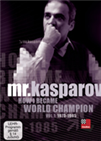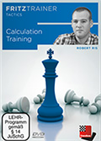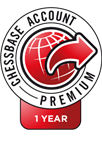Frederic Friedel
... was born on August 2, 1945, in Bombay, India, the son of a Bavarian father and a Portuguese-Indian mother. As a teenager he moved to his father's home country, studied philosophy and linguistics in Hamburg and Oxford, and finally ended up as a science journalist for German television.
His documentary film about how computers play chess was a great success. During the productions he met 22-year-old Garry Kasparov, who encouraged him to produce a chess database. Friedel met the young physics student Matthias Wüllenweber and both founded the company ChessBase in 1986.
Friedel, who celebrated his 75th birthday at the time he answered the questionnaire, is married and has two sons, Martin and Tommy, who work as programmers. Besides his work for ChessBase, Friedel blogs on his Chronicles.
Interview
1. Where would you like to be right now?
In Australia, South Africa or Antarctica — any continent I have not been to yet. This year I wanted to visit friends in New Zealand, but the Covid pandemic said "no".
2. What would you do if there was absolutely no chess in your life after tomorrow?
Write about science, physics, astronomy, ecology, medicine, philosophy, logic and skepticism — but wait a minute, that is what I already do on my biographical blog, the "Friedel Chronicles".
3. Who in your opinion is the a) most over- and the b) most undervalued personality in chess history?
a) I am not sufficiently familiar with historical personalities to make this judgement, but I myself am often overrated. People assume that I have to be a strong player, but I barely know how the horse moves.
b) The potential of a dozen Indian boys is still underestimated. They became grandmasters at the age of twelve or thirteen, and I believe that in a few years at least three of them will be among the top ten in the world.
 Garry Kasparov's rise to the top was meteoric and at his very first attempt he managed to become World Champion, the youngest of all time. In over six hours of video, he gives a first hand account of crucial events from recent chess history, you can improve your chess understanding and enjoy explanations and comments from a unique and outstanding personality on and off the chess board.
Garry Kasparov's rise to the top was meteoric and at his very first attempt he managed to become World Champion, the youngest of all time. In over six hours of video, he gives a first hand account of crucial events from recent chess history, you can improve your chess understanding and enjoy explanations and comments from a unique and outstanding personality on and off the chess board.4. Name a chess incident — which you experienced, read or heard about, yesterday or a hundred years ago, a game, a certain behaviour, a comment etc. — which has left a particularly lasting impression on you.
In the 80s and 90s I helped Garry Kasparov to prepare for clock simuls against Bundesliga and whole national teams. He won all the matches. Unbelievable!
Editor's note: In 1985, Kasparov lost a clock simultaneous against the Hamburg SK, with Murray Chandler and Matthias Wahls among others in his ranks, with 3.5-4.5, but took revenge two years later with a 7-1 win. In 1985 Garry played without any preparation; two years later he did one day of preparation with the brand new ChessBase 1.0 program.
5. Which topics would you like to see dealt with more in the chess public/chess press?
How in pandemic times, and beyond, whole areas of chess activities can be moved to the Internet in a player-friendly way. And how cheating in chess in general can be avoided, or at least greatly reduced.
6. What else would you like to learn in your life or regret never having learned?
So many things! For example, I regret never having learned Italian, that I did not study mathematics or physics, and that I did not complete my gliding license. Playing the piano at a respectable level would also have given me great pleasure.
7. What is embarrassing for you?
That I only barely understand so many things. Another 20 IQ points would be incredibly useful.
8. What kind of humour do you like? Give an example (a comedian or author, a film, a situation or an aphorism, etc.)
I grew up with Anglo-Saxon humour. I love irony, satire, clever jokes. Favourite comedians: Jack Benny, Bob Newhart, Lily Tomlin, George Carlin, Jerry Seinfeld... Too many to list them all.
9. What do you like and dislike about yourself?
I like the fact that I'm good with children and teenagers, and that I'm interested in many things. What I like less is that I'm a bit clumsy, and that I don't understand things as quickly and as thoroughly as some people I know.
10. Which grievances would you eliminate in your country if it were in your power?
The distribution of wealth and power, here and worldwide. The lower half of the world's population owns less than one percent of the total global wealth. There are eight men who own the equivalent of 3.6 billion people.
11. Who are your heroes in the present?
All those who are working to make the world a better place for humanity. Even when they know that the chances of success are extremely slim.
12. What question would you like to be asked and what is the answer?
Question: Could you help me to distribute my wealth — billions of dollars — among needy and deserving people or institutions? Answer: Yes!
13. Which three books can you recommend?
One each from Richard Dawkins, Christopher Hitchens and Sam Harris. And 97 more, if I may.
 This DVD emphasizes the importance of training your calculation skills. Dutch IM Robert Ris made a selection of training material which he uses in lessons with students ranging from 1400 to 2400.
This DVD emphasizes the importance of training your calculation skills. Dutch IM Robert Ris made a selection of training material which he uses in lessons with students ranging from 1400 to 2400.14. Which is the most interesting chess game you have ever played?
I have never reached a playing strength of 2000 Elo. For one year I played in a local club in Hamburg and won two nice games, which I can't reconstruct any more. In my early youth I used a single opening trap paired with skilful facial expressions ("Did I just make a dreadful mistake?") to win a dozen games.
15. Which players would you invite to a tournament and what would be the mode of play if a sponsor asked you to organize a tournament?
I would organize an Internet tournament "open to all", in which many of my grandmaster friends would participate. Just like ChessBase India does, with live commentary, on Playchess. I would also like to try a Fischer Random Tournament with slightly modified rules: no castling, with one, three or five starting positions announced one day before the start. So that there can be a minimum of preparation.
16. Which of your own achievements are you particularly proud of and why?
The co-founding of ChessBase, which initiated the democratization of chess knowledge. And that I managed the English news page for my company for more than 20 years. With it we were able to contribute to the greater popularity of chess.

"My two grandsons Enders, 8, and Hennes, 7, have become the center of my life."
17. Who would you like to swap with for a day, and why?
With Reinhold Messner when he climbed Everest without oxygen? Charles Darwin, when he visited the Galapagos Islands? Carl Friedrich Gauss, when he found the lost celestial body of Giuseppe Piazzi by pure mathematical calculation? I could name any number of other one-day exchange wishes.
18. When was the last time you did something for the first time, and what?
I have been thinking about artificial intelligence since I finished my studies. One and a half year ago I actually started working on neural networks for chess (Fat Fritz). For the first time I experience directly how machine learning works. It is exciting and scary at the same time!
19. How do you think that chess has developed (positive/negative) under the influence of the pandemic?
In contrast to soccer, basketball, baseball, cricket, tennis, badminton, ice hockey etc., chess does not have to be shut down due to the pandemic. You can play chess online with almost the same pleasure as physically over the board. At large tournaments the vast majority of spectators follow the action from a distance anyway. However, we must make sure that professional players of the second level also have a sufficient income, and that amateurs continue to find opportunities to actively participate in the game they love.
20 Current questions:
 At the airport, in the hotel or at home on your couch: with the new ChessBase you always have access to the whole ChessBase world: the new ChessBase video library, tactics server, opening training App, the live database with eight million games, Let’s Check and web access to playchess.com
At the airport, in the hotel or at home on your couch: with the new ChessBase you always have access to the whole ChessBase world: the new ChessBase video library, tactics server, opening training App, the live database with eight million games, Let’s Check and web access to playchess.coma) Please introduce ChessBase to us briefly: history, development, corporate structure etc.
ChessBase was founded in 1986 by Matthias Wüllenweber and myself. It opened up new training possibilities for amateurs and professionals and explains, among other things, why so many young players today can reach such an incredible level of play: they have powerful tools to study the game, at an affordable price. This includes the most powerful engines that they can use to search for new ideas and analyze them.
Over the years ChessBase has expanded its training program with countless interactive training videos. We have video lessons by top players like Kasparov, Kramnik, Anand, Caruana etc., but also of historical personalities like Viktor Korchnoi.
ChessBase has been a limited liability company based in Hamburg since 1988, and today has four shareholders: Matthias Wüllenweber, Rainer Woisin, myself and one more. We have a team of 30 permanent employees as well as a large number of freelancers, including GMs, IMs, chess trainers and teachers, who work for ChessBase Magazine and record "Fritztrainer" videos.
b) Your most important commercial pillars are the ChessBase program, Mega Database, varied chess engines, and the in-house product "Fritz", DVDs, and "Playchess" — or is something missing from this list?
Yes, the ChessBase Account, which has twelve web apps with which you can train within a regular browser. This service is becoming increasingly important. You can study openings, build and maintain your own opening repertoire, train tactics, watch videos, follow live games and top tournaments and much more. All of this costs less per year than one meal in a good restaurant.
c) In contrast, the daily online reporting in four languages is freely accessible to everyone as a kind of "ChessBase advertisement" — or how would you describe it?
We started in 1987, with ChessBase Magazine, to make chess more lively and colourful by including many photos — and soon video recordings. The news site, which has been publishing several reports daily for over twenty years, aims not only to bring the latest results of the international tournaments, but also to entertain, and above all to arouse or increase enthusiasm for chess. Brand new is our "Live Ticker," which constantly delivers theoretical innovations and tactical tasks live from the tournament hall.
d) In SCHACH 6/2020 the German junior grandmaster Dennis Wagner said: "... somehow Playchess has gone out of fashion, you don't find many strong players anymore." Does this also correspond to your perception?
Not at all! We concentrate on carefully monitored tournaments with real players. The recent Knighthood Online Blitz Open had 210 participants from a dozen countries. The highest rated GM had an Elo of 2726, the lowest rated was an amateur rated 1015.
Currently we are organizing, together with the the German and Austian Chess Federations a team league event with 2,000 players on Playchess. With that we have fulfilled a great need of the chess community: serious team matches with longer time controls. In the past weeks the German School Championship, the German Internet Championship etc. took place on Playchess. In the virtual club rooms anybody can organize a private chess tournament.
Brand new: we now include an interface to SwissManager. And very important: we play with real names! In our experience: less anonymity means less cheating!
e) What plans does ChessBase have for the near future? Are there goals of a creative and/or economic nature that are to be implemented?
ChessBase would not be over 30 years on the market if we did not reinvent ourselves again and again. We always try to develop innovative products for the normal tournament player that are really useful and fun. We still have many ideas — but I am not allowed to give anything away.
 The German magazine SCHACH is published by the Exzelsior Verlag, which was founded in 1999 as the successor to the Berlin Sports Publishing House. The monthly chess magazine is the flagship of Exzelsior.
The German magazine SCHACH is published by the Exzelsior Verlag, which was founded in 1999 as the successor to the Berlin Sports Publishing House. The monthly chess magazine is the flagship of Exzelsior.
SCHACH has been published since 1947 and has established itself as the most prestigeour German language chess periodical. Its main focus is on reporting on top national and international events. In addition, permanent columns, among other things with historical or educational character, take up a large part of its editorial space.
You can subscribe to the magazine here.



















 The German magazine SCHACH is published by the Exzelsior Verlag, which was founded in 1999 as the successor to the Berlin Sports Publishing House. The monthly chess magazine is the flagship of Exzelsior.
The German magazine SCHACH is published by the Exzelsior Verlag, which was founded in 1999 as the successor to the Berlin Sports Publishing House. The monthly chess magazine is the flagship of Exzelsior.




